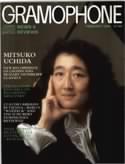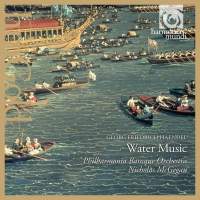Texte paru dans: / Appeared in: |
|
|
Outil de traduction (Très approximatif) |
|
|
Reviewer: Nicholas Anderson
This is a very attractive account of the three suites which comprise Handel's Water Music . The Philharmonia Baroque Orchestra are a San Francisco-based ensemble whose members play period instruments or copies of them . Nicholas McGegan has been their director since 1985 and, if this recording is anything to go by, he is achieving exciting results with them. Not that I like everything that McGegan does with the music; for instance, I hardly think it beneficial to introduce those notorious messa di voce gestures so emphatically to the graceful Menuets of the G major Suite; any semblance of light-footed elegance is destroyed at once. Elsewhere, I have litlle but praise for this splendidly colourful account of the music. There are some lovely sounds emerging both from the wind and string sections and McGegan sets an effective tempo in almost all the movements. Perhaps what I enjoyed as much as anything in this performance was its lively sense of occasion. McGegan creates a spontaneity, a feeling almost , that we are the first to hear the music and that we are intended to be riveted by it; and if even half the stories surrounding the circumstances which prompted the composition of the Water Music are true, that is exactly what Handel set out to achieve. The performance is greatly enhanced , furthermore, by a first-rate recorded sound: clear, ideally resonant and warm, allowing one to hear plenty of detail in the many varying textures; too much detail, some might argue on hearing the vociferous mechanism of some of the wind instruments.
To sum up , a
colourful performance comfortably on a level with that of The English Concert
under Trevor Pinnock's direction for Archiv Produktion . There are plenty of
small differences between the two in matters of stylistic approach and I would
not lightly forego Pinnock's fine reading of the Water Music.The English Concert
are certainly the more polished ensemble of the two but in one respect I
certainly prefer the new one and that is in its recorded sound, which is not
only less artificial than the Archiv balance but also captures more faithfully
the distinctive character of the instruments in a sympathetic acoustic. Which of
these two recordings you choose will be largely a matter or personal preference;
rest assured, you will not go far wrong with either and both are more satisfying
than any of their currently available competitors. The new version,
incidentally, contains variant readings of two of the movement s which are not
included in any other recording of the Water Music that I know of. |
|
|
|
|
|
Cliquez l'un ou l'autre
bouton pour découvrir bien d'autres critiques de CD |
|




